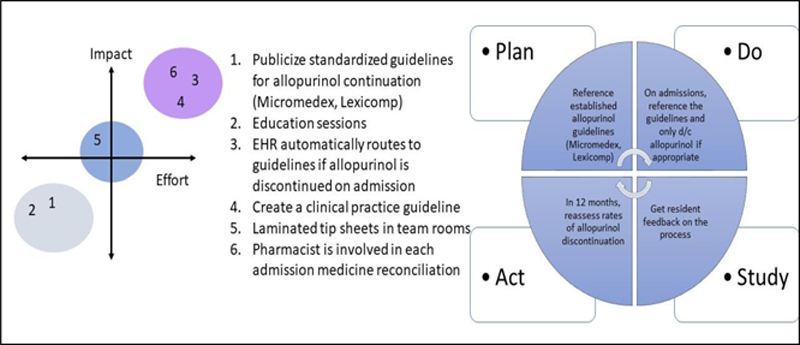

Background: Gout is a chronic inflammatory arthritis induced by hyperuricemia and manifested by recurrent acute flares of debilitating joint pain, when left untreated. Allopurinol is often used as long-term urate lowering therapy. Discontinuation of allopurinol leads to worsening flares, disability, poor quality of life, and frequent use of acute care facilities. Recent data revealed that 56% of hospitalized patients had allopurinol discontinued during an episode of acute gout flare, suggesting an unmet need for ongoing provider education (1). Gout flares are 14 times more likely to develop in patients who have allopurinol discontinued upon admission to the hospital (2).
Objectives: We performed a qualitative analysis of the current rate of discontinuation of allopurinol during hospitalizations at an academic hospital in order to develop a continuous improvement model.
Methods: We leveraged our electronic health records (EHR) to obtain data on gout patients admitted to the university hospital from 2019-2020, with IRB approval. Patients on allopurinol as an active home medication that was discontinued during hospitalization and/or after hospital discharge were included to calculate the rate of discontinuation. Lean thinking methodology with A3 process mapping for root cause analysis (RCA) was utilized. We first identified stakeholders involved in medication reconciliation – nurses and various providers, including trainees, and invited them to participate in an anonymous survey to understand the rationale behind allopurinol discontinuation during hospitalization. Next, we created countermeasures and actionable recommendations that could be implemented at an institutional level.
Results: A total of 2138 patients who were hospitalized had allopurinol listed as an active home medication. Of these, 364 (17%) did not receive allopurinol during hospitalization. Based on the survey data, providers chose to discontinue allopurinol due to the following factors – acute gout flare, renal impairment, gastrointestinal issues, cytopenia, drug interactions, NPO status, and always discontinued the medication. The RCA revealed layers of reasoning at various levels of the medication reconciliation process which impacted the decision-making algorithm. This in turn led to discontinuation during the admission and subsequent omission of allopurinol on the discharge medication list. Several actionable and high-impact recommendations emerged as countermeasures, including – a) pharmacy involvement at admission medication reconciliation, b) creation of a clinical practice guideline, and c) automated routing by EHR to standardized guidelines when allopurinol was discontinued on admission (
Countermeasures and Implementation Plan

Conclusion: There is evidence of inappropriate discontinuation of allopurinol that leads to gout flares in the outpatient setting and unnecessary resource utilization. We developed an implementation plan to mitigate this systematically at an institutional level. Testing these recommendations next to devise a standardized protocol as a continuous improvement strategy may help improve gout care and patient outcomes.
REFERENCES:
[1]Gnanenthiran SR, Hassett GM, Gibson KA, McNeil HP. Acute gout management during hospitalization: a need for a protocol. Intern Med J. 2011 Aug;41(8):610-7. doi: 10.1111/j.1445-5994.2010.02165.x. Epub 2010 Jan 4. PMID: 20059601
[2]Minalyan A, Ullah W, Khanal S, Basyal B, Zhang Q. The Discontinuation of Allopurinol in the Inpatient Setting and the Risk of Gout Flare: A Community-Hospital Experience [abstract]. Arthritis Rheumatol. 2020; 72 (suppl 10)
Disclosure of Interests: None declared